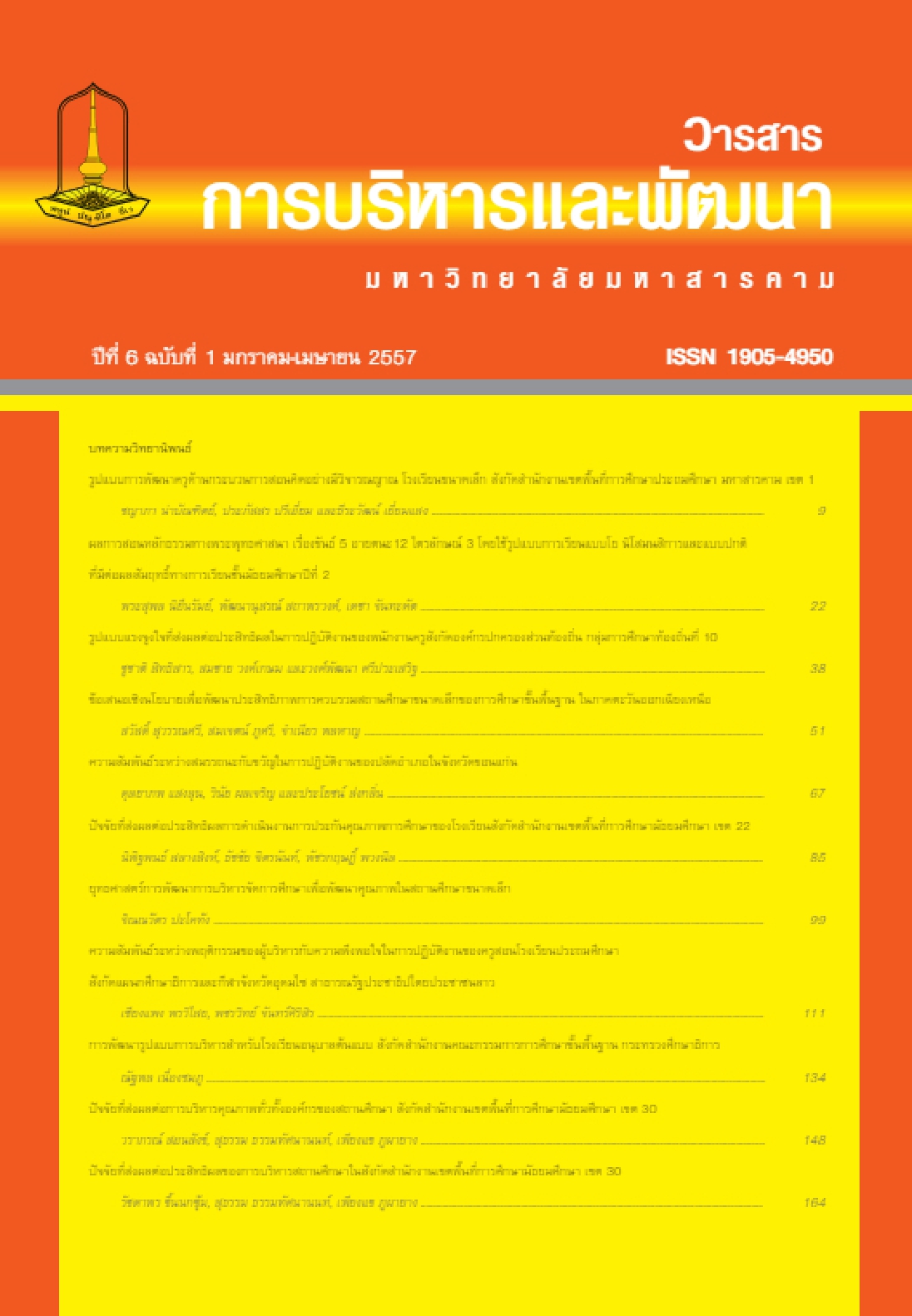A Teaching Effect of Buddhist Principles Entitled “Khan 5, Aryatana 12, Trilak 3” through Yonisomanasikan Model and Actual Model over Mathayomsuksa 2 Learning Achievement
Main Article Content
Abstract
The research study aimed to 1) create lesson plans on Buddhist principles entitled “Khan 5, Aryatana 12 and Trairat 3” under learning through Mathayomsuksa 2 Yonisomanasikan model and actual model based on 80/80 efficient criteria, 2) study efficient indexes of both lesson plans on Buddhist principles entitled “Khan 5, Aryatana 12 and Trairat 3” under learning through Mathayomsuksa 2 Yonisomanasikan model and actual model, 3) compare learning achievements on Buddhist principles entitled “Khan 5, Aryatana 12 and Trairat 3” under learning through Mathayomsuksa 2 Yonisomanasikan model and actual model between before and after the treatments, and 4) compare learning achievements as well as attitudes over instruction on Buddhist principles entitled “Khan 5, Aryatana 12 and Trairat 3” under learning through Mathayomsuksa 2 Yonisomanasikan modeland actual model. The samples were Mathayomsuksa 2/1 and 2/2 students under Huyrachpitthayakhom School in the
second semester of 2012 academic year through cluster sampling technique. The instruments were: 1) lesson plans on Buddhist principles entitled “Khan 5, Aryatana 12 and Trairat 3” under learning through Mathayomsuksa 2 Yonisomanasikan model and actual model, 2) a 4-choice of 30 items learning achievement test, and 3) a 5 rating scale test of students’ attitudes over learning through Mathayomsuksa 2 Yonisomanasikan model and actual model. The statistics for data analyses included percentage, means, standard deviation and t-test (dependent and independent samples). The results of the research were as follows:
The lesson plans on Buddhist principles entitled “Khan 5, Aryatana 12 and Trairat 3” created under learning through Mathayomsuksa 2 Yonisomanasikan model and actual model revealed 88.07/87.50 and 83.25/82.19 efficient criteria respectively.
The efficient indexes of both lesson plans on Buddhist principles entitled “Khan 5, Aryatana 12 and Trairat 3” under learning through Mathayomsuksa 2 Yonisomanasikan model and actual model were .6066 and .5179 as 60.66 and 51.79 percentages respectively.
The learning achievements on Buddhist principles entitled “Khan 5, Aryatana 12 and Trairat 3” under learning through Mathayomsuksa 2 Yonisomanasikan model and actual model after the treatments were higher than before.
The learning achievements as well as attitudes over instruction on Buddhist principles entitled “Khan 5, Aryatana 12 and Trairat 3” through Mathayomsuksa 2 Yonisomanasikan model were higher than actual model.
Downloads
Article Details
References
Academic Department. (2002). Basic education curriculum 2001. Bangkok: Organization of the parcel delivery and receipt.
Dararat Uthaiphayak. (2005). Developing teaching and learning model based on Buddhist approach to promote conservative behavior of the early childhood. Ph.d. Thesis, Srinakharinwirote University, Bangkok.
Flavell, J.H. (1979). Metacognition and Cognitive Monitoring. USA: American Psychological Association, Inc.
Lakkhana Sariwat. (2006). Thinking. Bangkok: O.S. Printing House.
Ministry of Education. (2008). The basic core curriculum 2008: Content and standards of learning in Thai language. Bangkok: Organization of the parcel delivery and receipt.
Office of National Education Committee. (1999). National education act. Bangkok: Kurusapha Press.
Phra Bunlert Nimsuwan. (2011). An effect of learning activities through Yonisomanasikan thinking entitled Buddhist activities in Mathayomsuksa 1. M.Ed. Independent Study, Masarakham University, Maha Sarakham.
Phramaha Sayan Pongphila. (2011). An effect of teaching a lesson entitled ”Life and Environment” through Yonisomanasikan model and actual model over learning achievement of Mathayomsuksa 3 students. M.Ed.Thesis, Masarakham University, Maha Sarakham.
Phrapromkhunaporn (P.A.Payutto). (2011). Study and practice to develop own-self most effective. Bangkok: Amarin Press.
Phrathampidok (P.A.Payutto). (2004). Buddhist method in teaching. Bangkok: Sahathamik Press, Inc.
Phra Winyoo Thaothawong. (2010). Comparisons of Thai learning achievement, analytical thinking and self-discipline between the Yonisomanasikan teaching approach and the teaching approach through teacher’s handbook in a
Buddhismcourse of Mathayomsuksa 5 students. M.Ed.Thesis, Masarakham University, Maha Sarakham.
Pramote Artvichai. (2010). A comparison of learning achievement and critical thinking of Mathayomsuksa 1 through Yonisomanasikan teaching activity and teacher’s handbook. M.Ed. Thesis, Burapa University, Chonburi.
Rosukhon Yomkanit. (2010). A study of learning process based on Buddhist approach. M.A.Thesis, Masajuralongkonrajchavitayalai University, Bangkok.
Wanitcha Laophorn. (2010). Developing work performance of students’ modification aggressive behavior under Bankhoknoi school, Namsoam district, Udon Thani province. Udon Thaini.
Wichai Wongyai. (2000). Curriculum and instruction development. Bangkok: Suveeriyasan Press.


